United by district, divided by rights
“Wait till you see what I can do to you!”
“We’re coming for you!”
Racism and assault. These were the themes of the multiple voicemails aimed at a Cypress College professor who was recorded in class without permission by a student in 2021. The student posted the recording on social media, where it went viral and was picked up by major news outlets.
The press rights organization FIRE obtained copies of these voicemails in a public records request to NOCCCD. Multiple professors that were majority women and people of color reported receiving individual threats as well.
A Cypress College representative told The Hornet that they “did involve authorities in response to some of the messages” they received.
However, Cypress College placed the faculty member on a leave of absence and did not condemn the student’s actions for recording a class against school policy.
Meanwhile, as threatening messages rolled in, Fullerton and Cypress College faculty went on the defensive. They alleged that NOCCCD has a culture that does not support faculty, even when threats were being made towards them that stemmed from a video that The Hornet later reported had been taken out of context.
One union leader stood up for the Cypress professor during several Faculty Senate and district board meetings, along with other minority professors that were impacted by the incident.
The Hornet is not using the union leader’s name in the story in order to protect their identity and limit the potential of further backlash from the public.
When the union leader, who openly criticized the district, was accused of discrimination, tensions between the union and district seemed to hit an all-time high. Nearly three years later, a state board has found the NOCCCD guilty of retaliating against that union leader and suppressing their free speech.
The case raised three questions about the district:
- What kind of speech is protected at the NOCCCD?
- What happens when the systems in place to protect students and employees are used against them?
- Finally, can trust ever truly be rebuilt between the union and the district?
The complaint that started the case against the union leader accused them of being “highly offensive/unprofessional,” while also having “created a negative work environment” for other employees. The NOCCCD further argued that the leader’s speech was too offensive to be protected under the activity of the union.
Protected union activity can be defined as union members and leaders having the right to talk about work-related issues in a number of ways, including in public board meetings.
However, this case raises questions about the limits of protected speech within union activities and the potential consequences for those who push the boundaries. If a union member says one thing that is too egregious, the speech can be deemed as unprotected.
That’s where the California Public Employment Relations Board comes in. They look at disputes between union members and employers and decide whether or not the speech should be protected.
“They [union members and leaders] do get a lot of leeway in their speech. PERB articulates that the standards of speech really have to be abusive or exceed the bounds of what would be acceptable,” said lawyer and PERB expert Tim Yeung.
If what Yeung said is the case, then what did the union leader say that compelled United Faculty to take the district to court in defense of their actions?
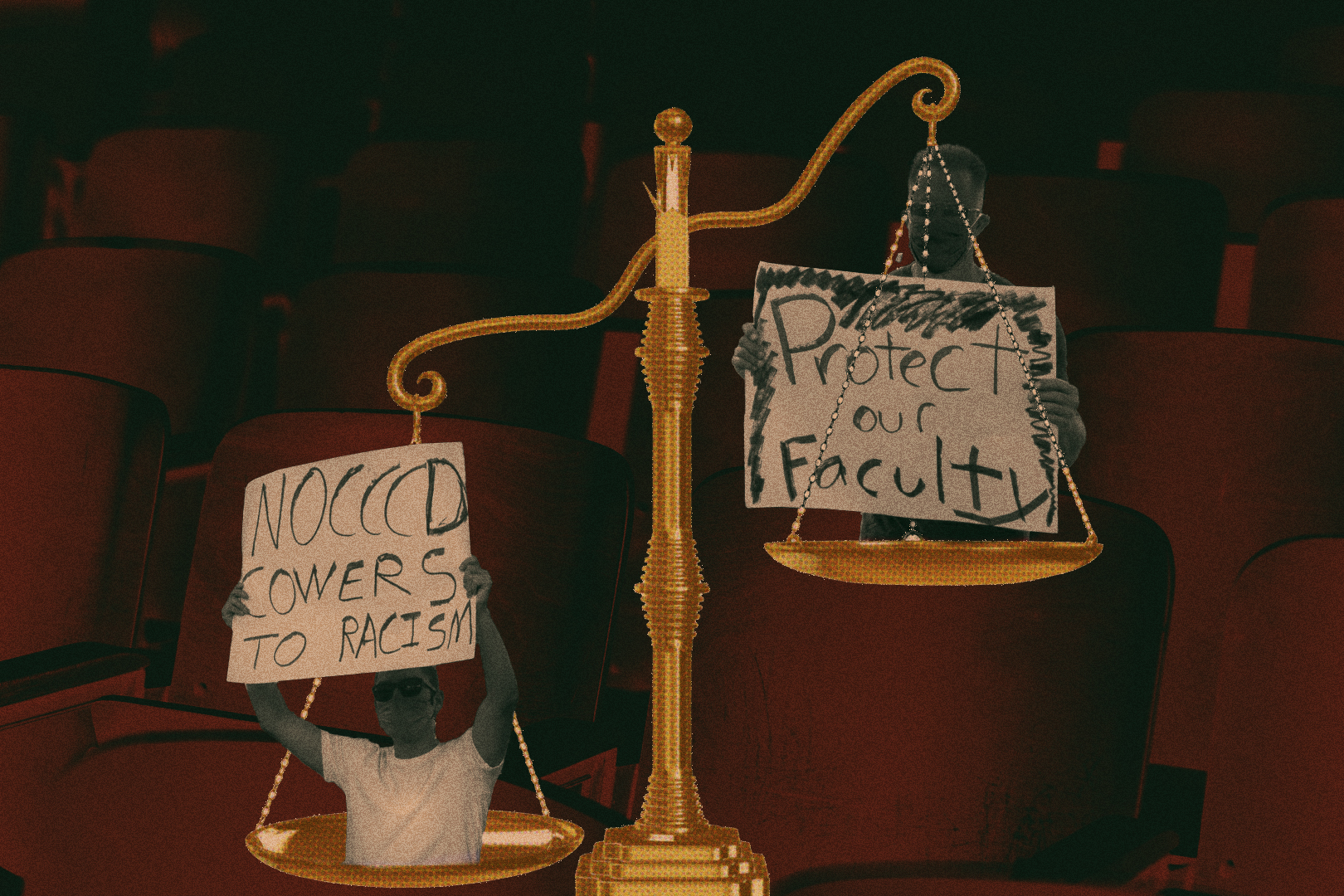
The union leader used the terms “toxic masculinity” and “male ego” during district board meetings.
To understand why these terms came up, we need to revisit the events of the 2021 viral video and its aftermath that impacted faculty.
People were upset. Faculty said Cypress and NOCCCD administrators were trying to protect their jobs and their image instead of supporting faculty members. At a Faculty Senate meeting on May 6, 2021, multiple faculty members spoke out against how the district was handling the situation, including the union leader.
During the meeting, the union leader spoke on the issue.
Other professors also chimed in at this meeting.
“And by appearing to throw an adjunct professor under the bus, for whatever we think of her methods, for trying to highlight the role of police abuse and American racism, I wonder what the leaders of Cypress College and the district are doing to be actively anti-racist in this situation,” said another Fullerton College professor.
At the following Faculty Senate meeting on May 20, 2021, the union leader continued to criticize the district’s response to the crisis, repeating the same sentiments they had during the May 6 meeting.
Even after the viral video incident faded from the news, tensions were still high between the union and the district. In the 2021-2022 academic year, United Faculty and the district were negotiating over both a successor Collective Bargaining Agreement (CBA) and a Memorandum of Understanding (MOU) regarding issues related to the COVID-19 pandemic. Topics of employee safety, equity and the return to in-person work during the COVID-19 pandemic were the focus of the meeting.
During the 2021 academic school year, a year after the pandemic started, both Fullerton and Cypress College were doing classes mostly on Zoom. However, district leaders wanted students to return to mostly in-person classes in the spring 2022 semester.
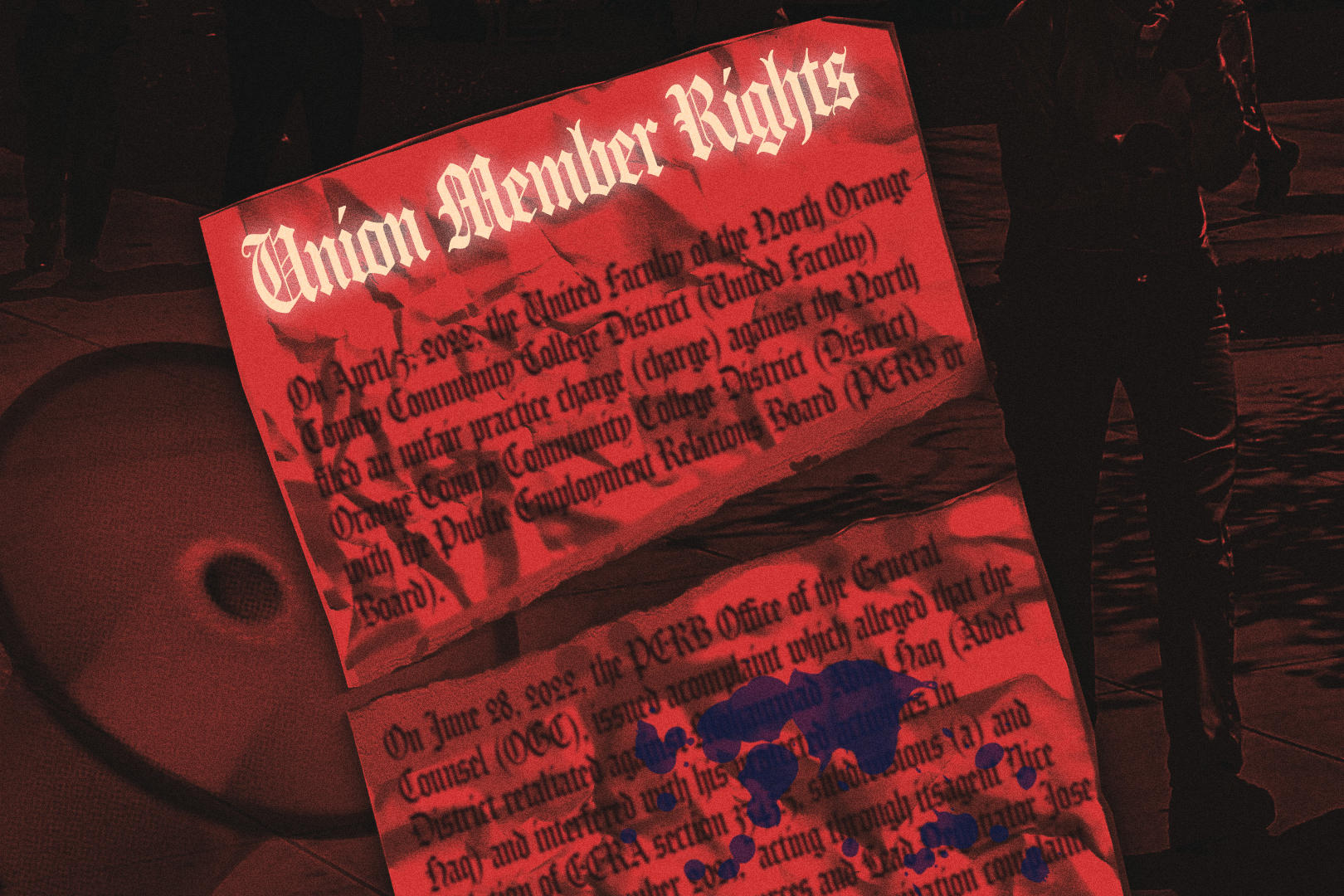
In a meeting with members of the Foreign Language Department and United Faculty that addressed concerns over the return to in-person classes, the union leader spoke about the impact for women. According to public documents reviewed by The Hornet, they said that household work and childcare are “disproportionately relegated to women,” and therefore the decision to bring faculty back to campus can disproportionately impact women colleagues.
On Oct. 29, 2021, the union had a bargaining session with the district. The union leader said management decisions were being made based on male ego and/or toxic masculinity, according to public documents reviewed by The Hornet. A transcript or recording was not available to The Hornet. The union leader later said in public documents that they were “referencing the culture and decision-making process…that ignores the needs and the disproportionate impact on your unit members that are women.”
One district administrator present at that bargaining session was José Ramón Núñez, the Vice President of Instruction at Fullerton College. He alleged that his gender and sexual orientation were used to discredit his work. According to public documents, Núñez said the comment of “toxic masculinity” was not directed at the Fullerton College administrative team, but just at him personally. He said the union leader was raising their voice and was aggressive.
On Nov. 17, 2021, Núñez filed a letter that was treated by the district as a formal discrimination complaint against the union leader.
According to public documents, Núñez asked the district to stop the union leader from “using discriminatory, hostile, offensive, unprofessional, untrue, and uncivil language towards me.” Núñez testified that he filed the discrimination complaint because the bargaining session on Oct. 29, 2021, was the first time that the union leader had addressed comments “[o]nly to me, and I thought ‘okay, this is enough . . . I’m not going to permit this anymore, and I want the district to stop it.’”
The Hornet contacted Núñez twice for a comment. He declined to comment about the topic.
Representatives of the district stated in public documents they have not just the right, but the duty to investigate discrimination complaints. But this wasn’t just any discrimination complaint. It was brought by a high ranking administrator against a union leader, both of whom were involved in union negotiations.
“It’s one of those situations where the department charged with investigating that complaint could have and should have dealt with it and disposed of it before it ever got to that level,” said Stephanie Joseph, a lawyer for California Teachers Association who represented United Faculty and the union leader in the PERB case.
The union wanted the district to consider protected union speech when conducting an investigation. If they didn’t do so, the investigation process could be seen as a form of retaliation.
When Núñez filed the discrimination complaint, it went to Vice Chancellor of Human Relations Irma Ramos. Ramos oversees investigations into employee conduct and is also the lead negotiator for the district when it comes to faculty union contracts.
According to the district’s Administrative Policy 3410, sections 3.2 and 9.3 permit the district to bring in outside investigators, and section 6.4 mandates a compulsory investigation once a formal complaint is filed.
Arturo Ocampo, who was NOCCCD’s director for diversity and compliance at the time, “requested that the investigation be ‘farmed out’ to an outside investigator,” because of his workload, according to public documents.
Patricia Weaver of the law firm Currier & Hudson was hired and conducted the investigation, for which she interviewed Núñez, the union leader and several other administrators and faculty members, but no other union members.
According to Ramos’s testimony, Weaver found that the union leader did not discriminate against Núñez, but did violate Administrative Policy 3050, which states, “Employees of the District are expected to treat other members of the District and members of the public with courtesy, honesty, professionalism, and civility.”
We attempted to contact Weaver twice via email for a comment, but received no response.
Ramos examined the investigator’s report and found no deficiencies in the investigation, according to public documents.
“Discipline processes for full time faculty are outlined in the California Education Code. The District adheres to these provisions, with the level of discipline being commensurate with the alleged misconduct,” said Ramos in an email to The Hornet.
The union took issue with the nature of the investigations. According to the PERB judge’s ruling: “There is no indication that the outside investigator reviewed available video evidence, indicating both a departure from investigative procedure and a cursory investigation.”
That’s when the union brought the case to PERB, saying that the district had retaliated against the union leader by launching a discrimination investigation into them over their protected speech – the speech which was arguing for the rights of faculty members in public meetings and bargaining sessions.
PERB accepted the case in June 2022 and launched its own investigation. In December 2023, the court announced its findings: The district had violated the union leader’s rights and was ordered to cease and desist from retaliating against employees for exercising rights under the Educational Employment Relations Act (EERA), interfering with or harming those rights, and interfering with United Faculty’s right to represent bargaining unit employees.
The PERB judge required the district to publicly post the decision and notify all faculty within 10 workdays of the final decision. The NOCCCD chancellor’s office sent the decision to faculty on Dec. 13, 2023, and posted it on its website and employee portal.
When PERB judge Shawn P. Cloughesy ruled that the administrator’s complaint against a union member was frivolous, he had to establish two things:
- The union leader was clearly involved in the union and that his speech was protected.
- The district’s actions qualified as retaliation.
The four elements of retaliation are as such:
- Employees are engaged in protected labor relations.
- The respondent is aware of this protected activity.
- The respondent takes adverse action against the employees.
- The adverse action is a direct response to the protected activity.
The union leader’s speech was about what they referred to as managers, who were majority men, making decisions about work conditions for faculty, who were majority women. According to testimonies from public documents, there is some dispute over whether those majorities are accurate. The union leader said they used the terms “toxic masculinity” and “male ego” through a sociological lens.
“Public employees’ right to engage in concerted activities therefore permits them some leeway for ‘impulsive’ and ‘intemperate’ behavior, including moments of ‘animal exuberance,” according to the PERB findings.
PERB concluded that the speech was opinion-based rather than factual. This distinction is crucial under the EERA, which safeguards employees’ rights to organize and express concerns about employer-employee relations. It also found that the audience the union member spoke to was educated enough to make their own conclusions on this speech.
PERB found that the union leader was “acting in [their] capacity as a representative of United Faculty.”
PERB’s investigation revealed that both Núñez and Ramos violated EERA Section 3543. According to the PERB judge, Ramos initiated an investigation and threat of corrective action, by finding that the union leader had violated the district’s code of ethics.
“Our local unions by and large try to do all that they can to educate employers like North Orange about their obligations, and give them a chance to right their wrongs before resorting to litigation,” said Joseph.
PERB determined that the act of conducting an investigation and filing a complaint against union members constituted “adverse actions” against the union leader.
“It is clear that both Ramos and Núñez were aware of [the union leader’s] advocacy for United Faculty and [their] protected speech,” according to Cloughesy’s findings.
When asked about these allegations, Ramos responded,
The Hornet contacted the Associate Vice Chancellor of Human Resources Julie Kossick, who reports directly to Ramos, through email and phone call, but received no response.
The Fullerton College Faculty Senate passed two resolutions in 2024 demanding accountability in response to the PERB’s findings. The resolutions call for holding the district administrators accountable for their investigation and advocating for greater academic freedom.
“We are looking for accountability and are strongly concerned about what happened to the union leader happening to any other instructor,” said Archie Delshad, a Fullerton College faculty senator and United Faculty secretary.
The case has left faculty members having a sense of fear and uncertainty about their own security and freedom, according to Delshad and other faculty senators who discussed the case.
The case has further ramifications, as it marks the second time Ramos has been found guilty of unfair labor practices under PERB. In an earlier case, PERB found that Ramos retaliated against Mt. San Jacinto College faculty members for discussing work conditions via email, which PERB determined was a protected activity.
When asked about this, Ramos responded, “As the District’s Chief Human Resources Officer, I oversee all personnel matters. It is not unusual for me to be named in PERB cases.”
Yeung, the PERB expert, mentioned that unfair practices, especially in the context of bargaining, can be scrutinized if there is a history of bad faith bargaining or failing to provide accurate information. Repeated offenses are considered more seriously. This is a relatively new approach by PERB, and, according to Yeung, there haven’t been many cases on it as of now.
“The district, their counsel has access to the same resources that we do as far as what the legal requirements are, what employers, particularly community colleges, are required to do,” said Joseph.
She also explained that it’s common for there to be animosity between unions and administrators, but this case stands out as it concerns free speech.
The situation underscores a troubling reality: if the district struggles with upholding something as fundamental as free speech for its faculty, what implications does this have for its students? The tensions between the union and administration are ongoing, and the path to rebuilding trust remains unclear.
“They’re concerned about what they can and can’t teach. And that’s not good for anybody. It’s not good for professors, but it’s certainly not good for students,” said Delshad.
Joseph expressed strong disapproval of launching investigations and labeling actions as unprofessional conduct, calling it “entirely inappropriate.” She emphasized that, in this case, the union leadership saw substantial issues with the district administration, which they perceived as an “old boys club.” She also saw significant problems related to equity for female faculty and faculty of color.
Joseph said that the union is committed to standing up for all individuals it represents, whether they are members or not, to ensure that colleges are making every effort to achieve equality.
In a written statement presented at the Feb. 29, 2024 Faculty Senate meeting by Delshad, geography professor Aline Gregorio stated,
The Hornet asked Ramos if there had been any policy changes since this case.
The response was a simple “no.”
“The District does not agree with the Administrative Law Judge’s decision. However, rather than appealing the decision, the District elected to comply with the order, so the matter could be laid to rest,” said Ramos.
This story was researched, reported and written by Fullerton College student journalists Natalia Fierro-Gomez, Sara Leon, Jake Rhodes and Pedro Saravia. Additional reporting done by Dylan Arreola. Art and graphics by Melisa Skinder. This project was supported by funding from California Humanities Emerging Journalist Fellowship Program. Any views or findings in this story do not necessarily represent those of California Humanities, the National Endowment for Humanities, or Fullerton College.
This story has been corrected. A previous version of this article said that Irma Ramos worked at Mt. SAC.





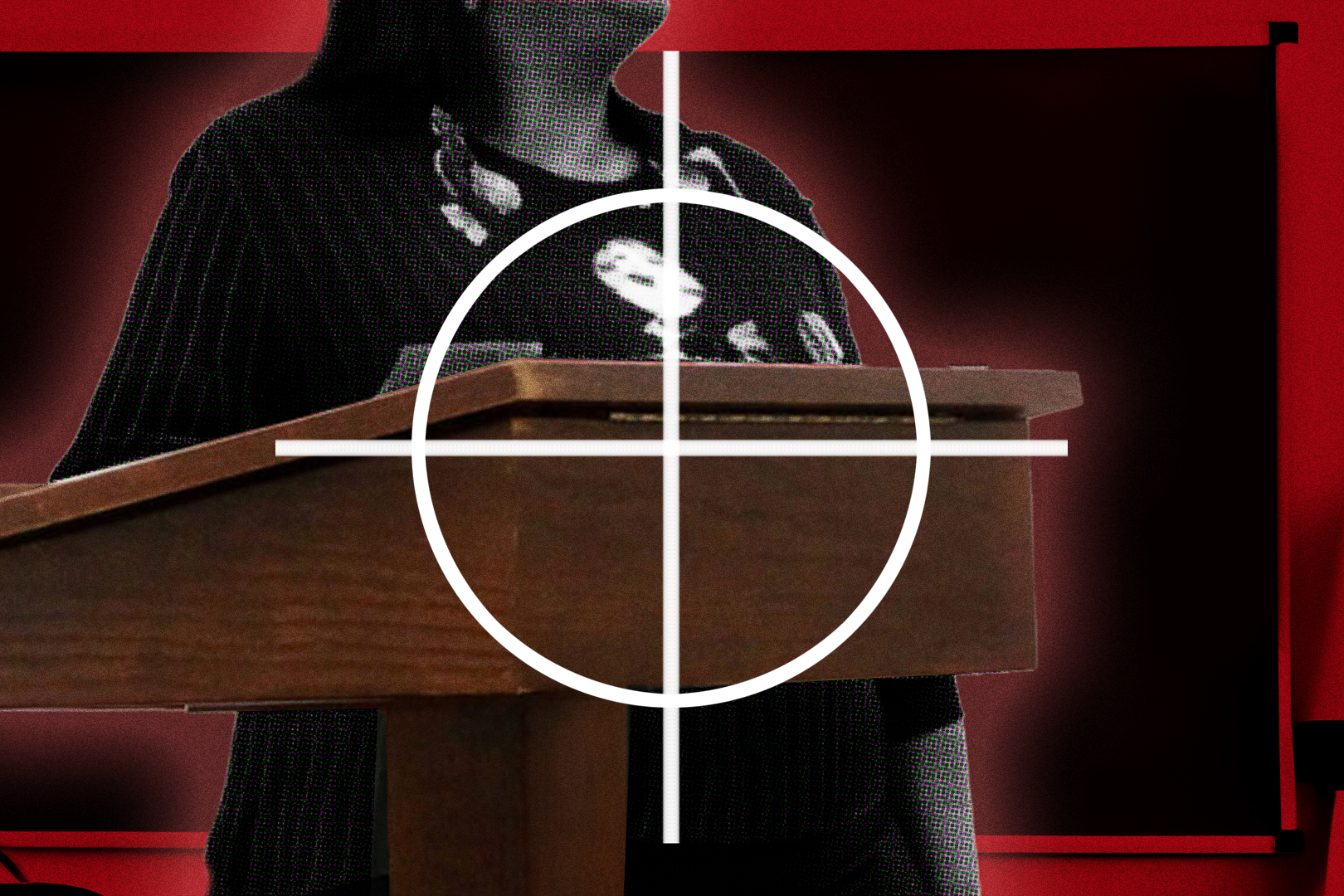
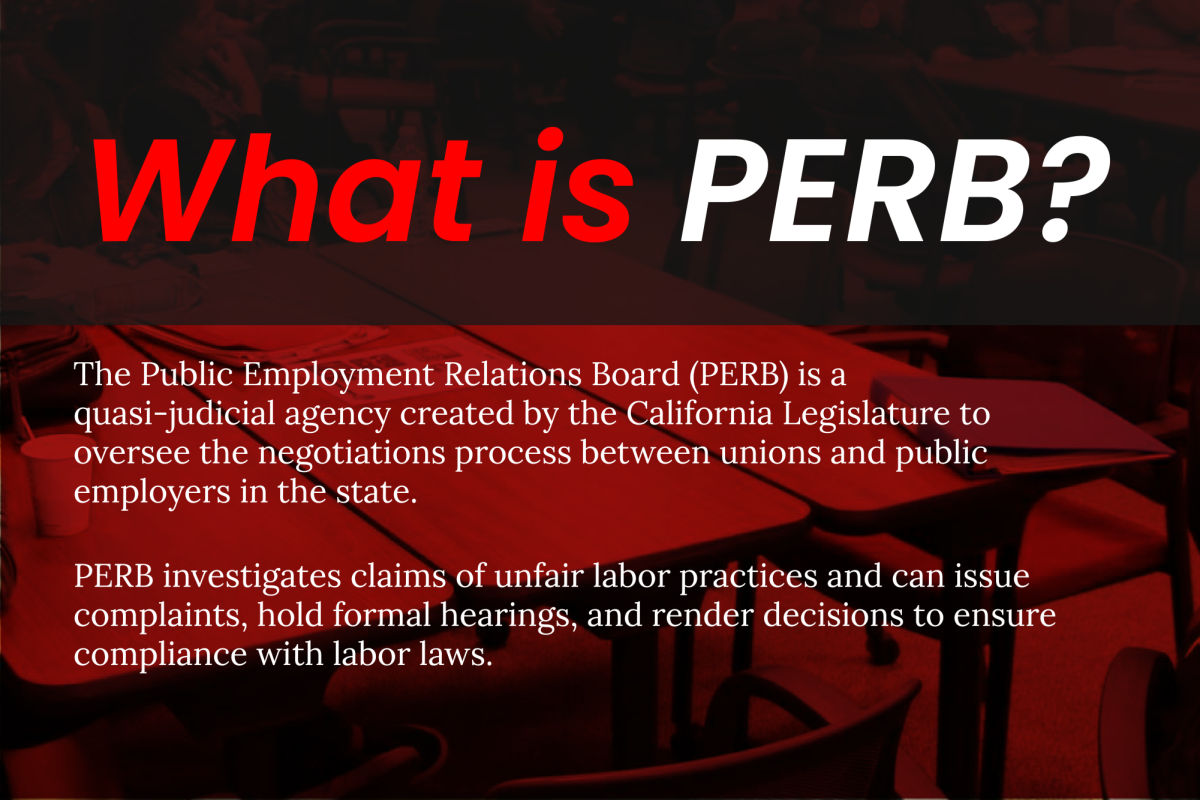
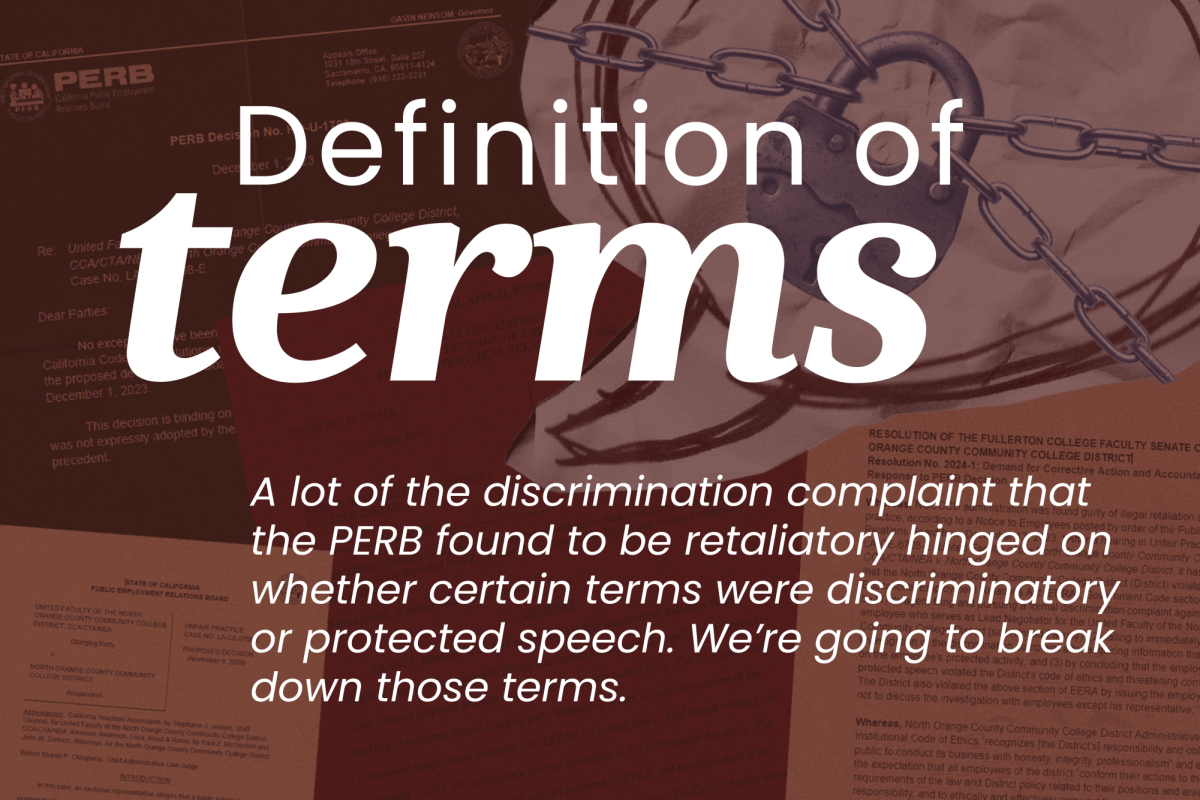
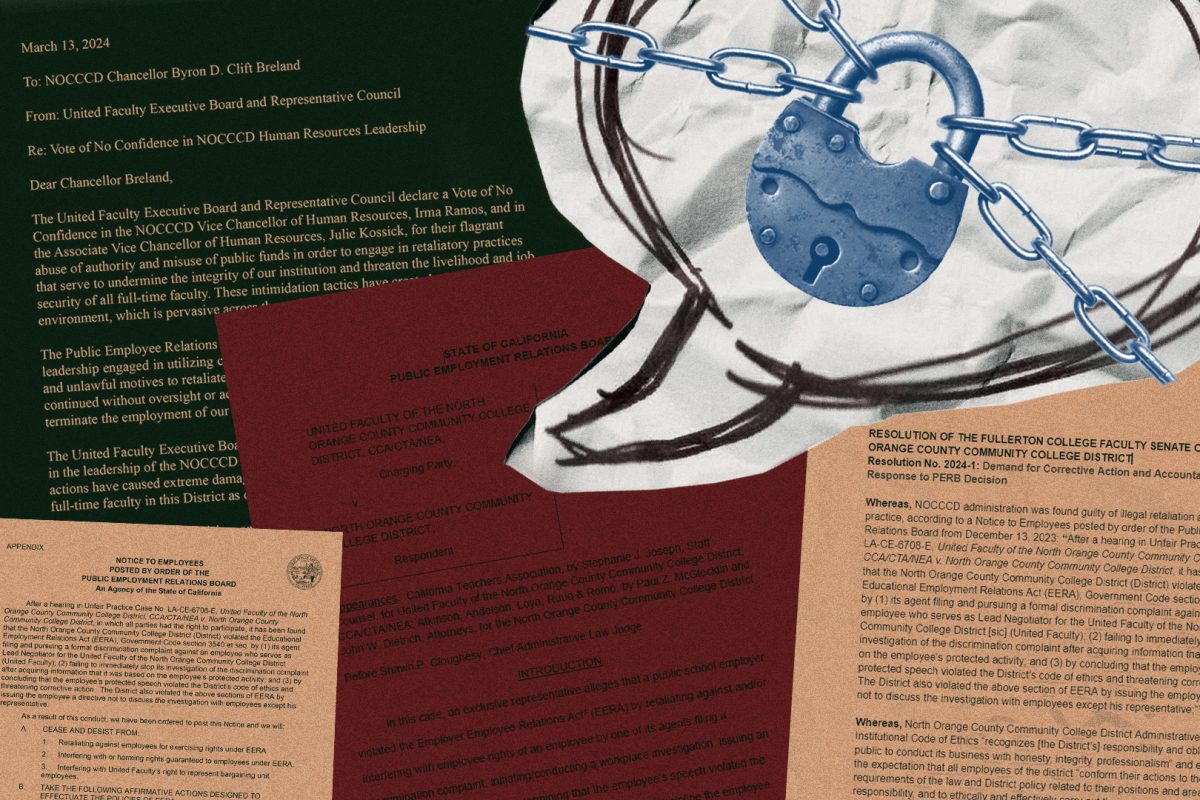
Aline Gregorio • Sep 24, 2024 at 8:26 am
Congratulations on a great piece. What is more telling is the indifference of NOCCCD administrators to the PERB ruling – they “disagree” with a ruling from a judge of law. What is there to disagree with? The PERB case extensively documents retaliatory and silencing behavior that is so pervasive in this District. Instead of taking corrective action, NOCCCD takes a disagreeable stand that ends with administrative impunity. Further, there has been no response to the resolution passed in both Academic Senates, representing hundreds of faculty members at FC and CC. The resolutions called for accountability for those found guilty of unlawful conduct, transparency of public funds used for investigations, and reaffirmed commitment to academic freedom. The District leaders are irresponsive to the community of scholars who have demanded course of action. In other words, amidst so much documented wrongdoing, there’s no sign of remorse or reform. I appreciate the Hornet shinning a light on this. Well done.